|
|
Andy and Arlene Sidaris

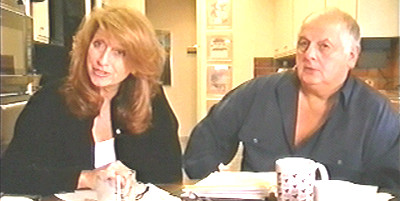
Ma and Pa Sidaris
BY G. NOEL GROSS | October 25, 2002
Click for the first of this two-part tribute.
"The family who does explosions together -- stays together!" So proclaims famed breast auteur and CineSchlocker idol Andy Sidaris, who with wife, Arlene, and son, Drew, has brought a DOZEN guns 'n' babes epics to the screen since 1985. Now that their all-out assault on the DVD world with The Andy Sidaris Collection has reached its halfway point, it seems an excellent time to reflect on the ambitious, extras-packed endeavor. In this exclusive interview, Andy and Arlene define their unique style of "family" filmmaking, reveal how DVD is helping to reach a new generation of horn'd up frat boys and offer juicy clues about their next explosive spy-world feature, Battlezone Hawaii!
- I'm not going to take up a whole lot of time, because I'm a little bit dizzy from watching all the movies in this first half of your collection. The commentaries. The film school. Everything y'all have poured into them is fantastic. There's just SO much! When do y'all find time for anything else?!
- Andy: It IS pretty good additional material isn't it!? Because we know the pictures are a couple of years old, we were trying like hell to give them a new shot in the arm. So that's why we did the extra interviews with people like Devin DeVasquez and all the other stuff.
Arlene: And there's more to come! It certainly is good for us. We felt we really wanted to give our fan base a good reason to buy the films again -- at a certainly reasonable price. We also want to draw in new fans. Disney built a dynasty based on every seven years a child goes to the movies for the first time. The Sidaris dynasty is built on the theory that every four years there's a college freshman in a frat house on a Friday night who wants to see a Sidaris movie! [Laughs.] In addition to that, it's great publicity and promotion for the women, because they have their websites and merchandise they're trying to sell and we can offer them more fans.
Andy: It's all commerce! [Laughs.]
- What's been the most rewarding part of putting together the collection?
-
Arlene: It's so intense when you're working as we do. There's so much at stake and there's so much pressure. To go back and to look at these films years later and ENJOY them is great. [Laughs.] I really like the films! Also, thinking about ways of promoting and adding to their entertainment value has been a lot of fun for us. It's hard work, but it's work we've really enjoyed.
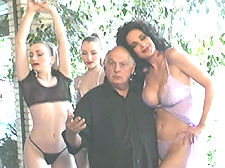
Julie Strain and friends moonlight as TAs -- Teacher's Aides.
|
 I've dutifully watched every installment of The Andy Sidaris Film School. I learned how to use a remote control car to blow up bad guys. I learned how to shoot a tender love scene. But there's one thing that's not covered, and it's sort of a biggie. If I'm a young filmmaker who wants to follow in your footsteps. Where do I get the Playmates? Do I just swing by Hef's and honk the horn? I've dutifully watched every installment of The Andy Sidaris Film School. I learned how to use a remote control car to blow up bad guys. I learned how to shoot a tender love scene. But there's one thing that's not covered, and it's sort of a biggie. If I'm a young filmmaker who wants to follow in your footsteps. Where do I get the Playmates? Do I just swing by Hef's and honk the horn?-
Andy: [Laughs.] Dail 1-800-PLAYMATES and pray. No, they're easy enough to get if you're legitimate types.
Arlene: Playboy has a casting department and they'll send the girls over for an interview. The jobs that they send them on are very varied -- everything from supermarket openings to major motion pictures. The girls LIKE doing our films, because our movies are so well known and when they participate in GlamourCon, and that sort of thing, they're able to sell autographed DVDs and photos from the film. They make money on that in addition to working as actors.
Andy: It really is a great benefit for them and it's a great benefit for us, because people all over the world know who Playmates are. That's really why we do it.
- And God bless you for it! With its interactivity and collectibility, DVD seems sort of made for you and other independent filmmakers.
-
Arlene: It's so funny, because years ago, people used to say that the general public wasn't interested in the behind-the-scenes of what goes on in movies. Well, television programing and channels like E! have all changed that. We can be in a little town in the middle of the country, where they don't even have a general store, and if you tell them what you do, they'll say, "What's the budget on your films?" [Laughs.] We know that people are really listening, and we think that what we do is unique. There's the fact we're a family company, but also just the way we work, the care that we take and, of course, the nature of our films. They're gratuitous, but they're not lascivious. There's no graphic sex. There's no graphic violence. There's no profanity. I think we have a little individual niche in the marketplace.
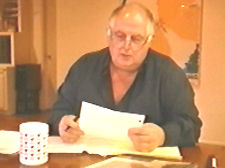
Andy is perplexed by words like "story" and "motivation."
|
 The family aspect really is what sets y'all apart. There's a neat reel on Enemy Gold titled "Let's Make a Sidaris Movie" that delves into that. Arlene, with your producer's hat on, what do you think are Andy's best assets as a director? The family aspect really is what sets y'all apart. There's a neat reel on Enemy Gold titled "Let's Make a Sidaris Movie" that delves into that. Arlene, with your producer's hat on, what do you think are Andy's best assets as a director?-
Arlene: Because of his experience with live television, he really has a vision about what he ultimately wants to see on the screen and how to get there. That has to do with being able to spot a location with proximity and convenience being tremendous considerations. We'll look like we're in the middle of nowhere and in real life there are two bathrooms 50 yards away, a restaurant within walking distance and a place to use the phone. Also, his ability to edit in his brain. That's why we shoot 5-to-1 instead of a 100-to-1.
Andy: A friend of ours who unfortunately passed away, Johnny Alonzo, was director of photography on Steel Magnolias and China Town. He said they would use 70,000 feet of film just for tests. We do a picture for 45,000 feet. The budget for Pearl Harbor was $600,000 a day. We do a picture for what they spend in a day!
Arlene: Another thing is Andy's real respect for the safety of the cast and crew. We do things that look like there's danger, but there is NEVER, under any circumstances, anybody who's in any sort of compromising position.
Andy: We have professionals doing that stuff, and we use the old tricks of the long lenses to foreshorten. You've got an explosion behind someone and you use a 600mm lens to make them look like they're right up against that explosion. Meanwhile, it's 50 yards behind them.
Arlene: And we take a decent long day, but we don't go overtime. We are basically non-union, but we do not push people's physical limits because that's how accidents happen.
Andy: A lot of people think it's cute to work 20 hour days, but it's not, it's stupid. The dumbest thing I've ever seen in my life, and I'd say it to anybody, was watching Cast Away, which is a terrific picture with Tom Hanks, but for the fact they went to some small island that they had to take a hundred boats to get to every morning. They had to leave at 3 in the morning to get there at 5. Then wade into shore to where they built a little city with toilets and things. When they could have gone to Molakai! We were shooting on the golf course. We'd be in the "jungle" and turn around behind us and there was the country club! Two hundred yards out from the hotel there were mountains and the ocean. Meanwhile, they went to some little island. It's absolutely stupid to take a crew down there and risk their lives every morning.
Arlene: Don't you want to know what my qualities are that are so valuable? My organizational skills? My attention to detail?
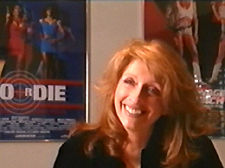
Arlene guides every picture "from the womb to the tomb."
|
 Exactly, exactly. Come on, Andy. Lay them out. Exactly, exactly. Come on, Andy. Lay them out. -
Andy: Arlene takes my wonderfully written scripts and uses words like "story" and "motivation." You know, all those hard, long words. She makes everything work. I'm really rather lazy, but I happen to be brilliant.
Arlene: He's not kidding, by the way. [Laughs.]
Andy: I kind of scam all this stuff together. Arlene takes it from the womb to the tomb. She takes the script and helps me polish it. She hires the people. She takes care of every detail from the taxes, to the wardrobe, to the sets. She's on top of everything. More than that, she keeps an eye on the budget. The point is, Arlene does EVERYTHING! It's amazing to watch her perform. We're a two-man operation here because we like it that way. There's no surprises.
Arlene: When we first started working together, we would have arguments, people would leave the room. They didn't want to be in the same hemisphere with us, let alone the same room! But over these 12 movies, we've come to get along really, really well.
Andy: There's real satisfaction in having this as kind of a Ma and Pa Kettle operation. It's like a small Greek restaurant or cafe. I do the cooking. She does all the cashiering and waitressing. We all clean up together. It's like dishing out some Greek hash. To be able to do these movies independently is terrifically satisfying. But it's harder for us to make a deal because we won't compromise. I'm not gonna write a 100-page script. Not only am I too lazy, but I think it's worthless. Because we put up our own money, I'll write a 40-page script. I'll say, "Noel, Andy and Arlene go into the restaurant. Noel holds up the cashier. Andy grabs the silverware. And they all run out the door." A writer would take eight pages to say, "Closeup. Action. Cross shot." All we're gonna say is, "Everybody, this is a hold up!" Boom. In and out. I'll block it in my mind. I know how I want to shoot it. I'll write the dialogue, but I'm not going to sit there and block out every shot in writing. I'll go to a location and say this is where I want you to walk. And I'll know all that since I'm writing and directing.
- Speaking of, when can fans expect to see your next picture -- Battlezone Hawaii!?
-
Andy: Yes, we expect to do Battlezone next year. What we're doing right now is trying to create the funds and make sure it makes sense financially.
Arlene: There's always a lot at stake and it's very personal, because we don't have the support of a studio. For the major portion of Andy's career he was one of the pioneers of ABC Sports. I also had a traditional studio background. Having that support is a great way to learn the business, but doing this on our own is different. Now, I never have to ask anyone if I can spend a $100, but the bad news is, it's my $100.
Andy: It's a bitch putting this new movie together because the markets have changed so much from the olden days. It's coming back, but in the late '80s when we did Hard Ticket to Hawaii and Picasso Trigger, the foreign market was really strong. You could go over there and pre-sell enough to damn near make your budget. That left you the United States, Canada, HBO and Showtime for making a profit. But all 12 of our movies are with Warner Brothers for worldwide television, pay-per-view and pay cable rights. That's where we can make some bucks for Battlezone through licensing. We've already had some of them playing on TNT.
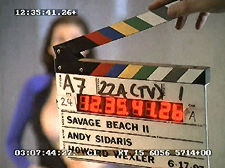
Shae Marks is about to unleash her "hot cleavage" for TV land.
|
 As flesh-friendly as your pictures are, how do you avoid having them slashed to pieces on basic cable? As flesh-friendly as your pictures are, how do you avoid having them slashed to pieces on basic cable?-
Andy: We don't do any dialogue on nude scenes, because the hardest thing to do is change audio tracks -- to do a track in R and a track in G. What we do is have a shower going, or some kissing and music. So if you've got a girl in the shower and happen to show her from the waist up and she shows some breast, that's cool. Then you come back and shoot again the same amount of time, exactly frame for frame, with really hot cleavage. Then you have a TV version and an R version. The sound remains the same. If there's 12 scenes that have nudity in them, we go back in and lay those G-versions right in over the R-versions.
- And with no four-letter words to speak of, you're pretty much home free?
-
Andy: That's right. We don't use any profanity. Only once before have we used the f@#% word. We used it in Malibu Express when Art Metrano screams it out the window of his Cadillac. After that, we never used anything near that bad until Roger Moore's son, R.J. Moore, couldn't say the word "undoubtedly" in Hard Hunted. He tried it about four times and then he said, "F@#%!!!" We saved that outtake and used it for when Donna Speir jumps out the plane, blows it up and we cut to him listening to all this on his yacht and he says, "F@#%!!!" It's so perfect for the scene and yet it was really meant because he couldn't say "undoubtedly." That's going to be an upcoming DVD segment: "Why We Said the F-Word." It's going to be a very cute, funny bit. But normally, we just use hell and damn.
- Big money Hollywood is pitting two horror icons against each other with Freddy vs. Jason. Which causes me, and other people with too much time on their hands, to wonder -- How about a Donna Speir vs. Julie Strain matchup in Battlezone?
-
Andy: I'd love to bring Donna back!
Arlene: Oh, definitely, there's a role written for her whether or not it'll work out time wise. It's also been awhile, and she's kind of got another life. We see her, we talk to her and we're actually talking to her about doing a behind-the-scenes segment. Maybe she and Roberta Vasquez can talk about their experiences in an interview kind of thing.
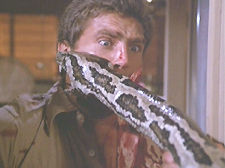
Hard Ticket to Hawaii's toilet-diving, cancerous python lives on!
|
 What can you tell me about Battlezone's plot? What can you tell me about Battlezone's plot?-
Andy: We're bringing the snake back!
- Oooo! It's not going to be a CGI snake is it? Bring me the giant rubber snake!
-
Andy: It's more fun isn't it?! Before it was killed, the original snake layed an egg, and this is 10 years later and the baby snake is bigger and meaner than its parent. But with the same cancerous-ridden saliva and all that crap. I don't see how you can beat that! I love that snake, don't you?
- Oh, I'm a big creature feature fan anyway, so that's totally for me.
-
Arlene: Creatures and cleavage!
- Amen! How much do you think so-called "Jiggle TV" -- the VIPs and Baywatchs of the world -- was influenced by the Sidaris empire?
-
Andy: A fabulous editor friend of mine, David Hagar, who did fantastically beautiful Playboy videos, went to work over at "Baywatch." He started out as an associate producer, then a producer and then he directed several episodes. He called me one day to say, "Andy, one of the things I've got to tell you, it's really funny, all of your movies are up here on the shelf. We look at them all the time!" So, they certainly paid homage to us, and I think they did a wonderful job. They turned out a lot of terrific shows. A lot of people say, "Oh, that piece of crap," but we think they did a hell of a job. They did marvelously. David Hasselhoff gave so much work to so many people. I think he's to be commended. And it was a very successful series. It turned out a billion dollars worth of business.
- The Andy Sidaris Film School offers some terrific, practical "How To" advice, but in your experience, what are some pitfalls to avoid?
-
Andy: Some people who've learned just enough about directing to be dangerous try to get next to the director of photography by using technical terms like, "That shot's good. I like that shot. Check the gate." They tell the f@#%ing cameraman to check the gate! It's almost like telling a guy to check the air in your tires! What the f@#% do you think those two assistant cameramen are doing!? They're not checking their nose hairs. Check the gate!?
And another thing. Guys who go around with viewfinders to frame a f@#%ing shot. If they don't know what a 50mm will get, or a 75 or a 100, then they should be doing something else! If I walk up to a guy who's sitting in a chair and put my hand just below chest level and say, "This is the way I want this medium closeup." And you look at the DP and nod. If you can't walk away from that knowing they're going to give you exactly that, and you need a viewfinder, then you ain't never done any television, dude. You should know what a lens will get you. These guys who spend all day blocking and looking through their viewfinder -- that's a lack of confidence. You hire professionals you trust and know they're getting it.
People who watch monitors also suck! You should be on the side of the camera, watching the performance, and everything else that's going on around. You watch a monitor if you're directing a television show. You don't watch a monitor when you're directing a movie.
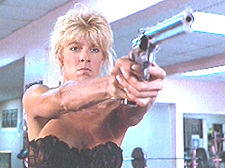
Why gawk at a dinky monitor when you can ogle Donna Speir?
|
 What's the difference? What's the difference? -
Andy: A lot of difference! If you want to see what the lens is getting, you can go back and look at that monitor after you do the take. But during the take, you should be right there eyeing your talent closeup in real, full life-size. If you're seeing a 12- or 15-inch monitor, first of all, they're reduced to the size of your thumb. Secondly, you're not seeing what's going on. Your eyesight is a 28mm lens. Even if you're on a tight shot of two people kissing, or talking, your eyes are seeing left and right and all around. What's going on in that particular set? Is there somebody being cued in? Is an actor being distracted by somebody off camera? Do you need to scream at the f@#%er and tell them to stop? But somehow, by putting on a headset and looking at a monitor, they think it's cool and, "Oh, yeah, I'm watching what the camera's doing." Forget what the camera's doing! If you're looking at a monitor to direct a movie, then you're one of these people who got caught up in the excess electronics.
- What about writing? Your films are known for their globetrotting, intricate plots. Surely coming up with ideas isn't easy.
-
Andy: I think I'm a pretty good storyteller. I think Savage Beach is as good a story as anything. It's a throwback to the old days of adventure pictures. Anybody can shoot a back alley and have two guys say "mother f@#%er," stab each other and call that a movie. That's what most people do. We don't do that. We don't hold women hostage, or slash their throats. I see movies that are so despicably mean spirited that I can't believe them.
I got the idea for Return to Savage Beach when I read about the Marcos family in the Philippines who re-looted treasure stolen by the Japanese. They're still looking for a billion dollars of that money. I get ideas from the news and stuff like that. It's rather interesting to write these stories, because I write them to what I know I can do. We can all write, "Three churches blew up and a tank goes through a supermarket." Well, I can't do that picture. Not on this budget. But we can borrow a Mercedes, take its junkyard lookalike into a park in Shreveport and blow it up. You write for that.
Arlene: You see, Andy really is a very nice storyteller and sometimes the stories get overshadowed by the cleavage. [Laughs.]
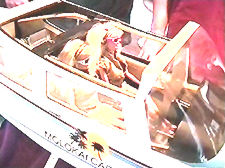
Sidaris-quality miniatures right down to the unbuttoned shirts.
|
 I definitely think Savage Beach is my favorite of the whole bunch just because it IS a great story. But it also, as Arlene says, has the cleavage and features probably your best scene ever, which is the girls flying through the hurricane and deciding to change their clothes. I definitely think Savage Beach is my favorite of the whole bunch just because it IS a great story. But it also, as Arlene says, has the cleavage and features probably your best scene ever, which is the girls flying through the hurricane and deciding to change their clothes. -
Arlene: Good! I'm glad you liked that. There was a company that used to office on the same floor as Andy. The woman had gotten a job on Aliens and she wound up, in two years time, picking up an Academy Award! So she went into her own special effects business, and this is somebody we knew very well, she knew what we did and that we had small budgets, and she said, "Please come in, I'd like to do the special effects for your next film." So, we went to have a meeting and in the conference room they had like 25 varieties of donuts! And we knew, "This is not for us. We're way over budget here!" [Laughs.] We wound up being so resourceful. Two rocket scientists, literally, who did this as a hobby, built this genius model airplane that's now hanging in our living room. I'm glad you enjoyed that. That really thrills me.
Andy: A black background. A $1.39 for one of those sprayers that goes on the end of a hose. Two ladders. A fan. A $25 rental of a smoke machine. A thousand bucks for the model. And we were able to create all that with the little airplane and match it with the real plane. While the effects house started out talking around the $18,000 mark. So, it was either buy two new cars, or blow up 12 cars, or pay for these effects. Oh, no, we had to figure it out for ourselves. That's the kind of thing that makes it all worthwhile. That's why we love this business.
- I understand your upcoming book, "Bullets, Bombs and Babes: The Films of Andy Sidaris," has an interesting origin?
-
Arlene: Yes! We started getting correspondence through the internet from the editor of "Gotham" magazine. It's a pretty well known movie magazine in Spain. They were very nice, enthusiastic and charming. Over the course of about a year, we got them in touch with all the women and guys for interviews. We sent them a lot of photos, and then they came out with a summer issue entirely dedicated to "Andy Sidaris: El Rey de Action" (The King of Action)! Then Kevin Eastman, who was one of the co-creators of the Ninja Turtles, publisher of "Heavy Metal," and a friend of ours.
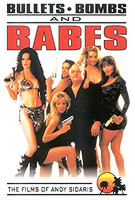 He's also the lucky fella married to Julie Strain! He's also the lucky fella married to Julie Strain!-
Arlene: Yeah! He saw the magazine and said, "You know, the most expensive part of publishing is the plates. If they will let you use their plates, I'll publish a book." So I wrote back to them saying Kevin Eastman would like to do this and they wrote back saying, "Oh my goodness, to work with Kevin Eastman! To work with Andy Sidaris! Anything you want. We'll do it!" All of the images are basically all the behind-the-scenes photos that I've been taking for years. I take up to 1,000 photos for our press kits and promotion. They've been sitting dormant in these albums. Now, they're going to be used for the book, which is a great way to share all this material with fans!
Andy: It's fabulous what Arlene has done in putting this together. Julie Strain has a book called "Six Feet Tall and Worth the Climb." It's about a 100-page hardcover, tabletop book. That's what ours is going to be. Forty-eight pages in black and white, 48 spectacular color pages with literally hundreds of great looking pictures from our movies. They're very sexy, hot pictures. I think you'll enjoy the book a lot.
- Now I know what I want for Christmas! Another part of what makes Sidaris pictures unique, and gives them a sense of scope other B-pictures lack, is your ambitious use of exotic locales within each flick.
-
Andy: We've done as many as nine states in one movie. Nobody does what we do in the kind of inexpensive pictures we make. Like in Hard Hunted, to start in two islands in Hawaii, and to go to California, Texas, Louisiana, Arizona and Nevada.
Arlene: We do it as a challenge. Anybody can do a couple of talking heads in a room for very little money, but we really enjoy squeezing every ounce of blood out of every penny.
Andy: We believe people like yourself appreciate that. The stuff you saw in Washington. People say that's stock footage. Yeah, but WE shot it! One of our assistant cameramen was going to Washington to visit his dad, so we gave our camera and 800 feet of film and put him on the airplane. The only two stock shots we've ever paid for was for Hong Kong and some African animals. In 12 films, that's the only two things we've ever paid a nickel for. I shot all the stuff in Paris. One of my favorites is Picasso Trigger. I like John Aprea. I like the Paris sequences and the double-twist with the killer. But I like all of our pictures. My favorite picture is the next one.
- Well, we're all looking forward to that one! Y'all have been so generous with your time and so gracious.
-
Arlene: It's our pleasure. We really appreciate that you enjoy the movies, write about them and share your wisdom.
Andy: The best thing about it is that you get the joke, Noel. That's all we ask for. Just get the joke and know that we're all out here just having a good time. We're not trying to change anything. We're just trying to entertain.
G. Noel Gross is a Dallas graphic designer and avowed Drive-In Mutant who specializes in scribbling B-movie reviews. Noel is inspired by Joe Bob Briggs and his gospel of blood, breasts and beasts.
Archives
Columns
|
|


